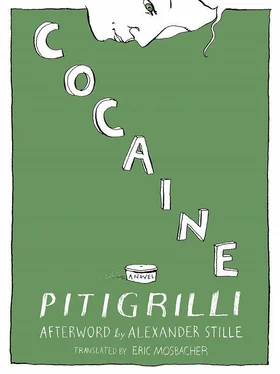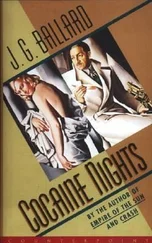The sea was not so calm as it had been during Tito’s last trip.
He went pale and, like dying Meleager, pressed his fist to his abdomen and said humbly: “If you’ll excuse me, I think I’ll go back to my cabin.”
The chemical manufacturer was offended. “Don’t these things interest you?” he said.
“After I’ve eaten talking about food makes me feel sick,” Tito explained, “I’m like those men who, after they’ve had a woman, look the other way.”
“What men?”
“All men.”
And without further ado he went down to his cabin and did not emerge until a week later, when he landed on the aromatic coast of Senegal.
Dakar.
On the wharf the white robes of Arabs and the white uniforms of European officials, whose sun helmets made dark shadows like a domino on their luminous faces, stood out among the crowd of black porters.
But there was no sign of Cocaine. He would immediately have recognized her white silhouette surmounted by the glittering halo of her sunshade.
As soon as the disembarkation formalities were over he took the road that opened straight in front of him. The Berber village was on the left and the European quarter on the right; at the end of the road a minaret rising from a kind of oasis stood out against the red sky.
There were Senegalese soldiers, khaki-clad Europeans, an Arab-type bazaar, non-commissioned officers overloaded with stripes, peaceful black civilians of indefinable age sitting on leaf mats in front of their tukuls and imperturbably smoking their hookahs.
Two blacks came up to Tito and in appalling French (the kind spoken by Calabrians who don’t understand it) offered him a shave and a shoeshine, which he declined. A few yards further on he saw a decently dressed man sitting in a chair and undergoing the ordeal of being shaved and having his shoes cleaned at the same time.
Berber women had thrown their long breasts over their shoulders to satisfy the hunger and impatience of their swaddled babies, who sucked behind their mothers’ backs with an absent-minded indifference that was indistinguishable from that of their fathers squatting on the mats and smoking their hookahs.
A small boy, four or five years old and as naked as he was born, clutched Tito’s trousers and said:
“ Mossié, moà avoàr belle mere dormir avec vous, dis francs. ”
Tito tried to shake him off.
“ Mossié, moà avoàr très belle soeur sept ans, dormir avec vous vingt francs.”
A European providentially arrived and freed him from this importunate child. The man was the owner of a comfortable teahouse equipped with the additional attraction of a number of Berber girls. The oldest was sixteen. He explained that Berber women were the most exciting in the world, because they were hot-blooded, shaved every morning with a cut-throat razor and sprinkled themselves with rose water.
“Once you’ve had a Berber girl you’ll never want any other,” the man said.
“In that case, in view of the fact that there are very few Berber girls in my country, it would be a mistake,” Tito replied. “Instead will you be kind enough to tell me which is the best hotel in the town?”
“There it is, the Hotel République Française. So I can’t fix up anything for you, sir? You would have been very satisfied. At all events, here’s my card. Don’t hesitate to honor me at any time.”
Tito took the card. The brothel-keeper was so polite that Tito found it impossible to turn him down flat. He extricated himself as he had done a fortnight before when he said goodbye to his friend the monk, who was anxious to lead him back to God.
“I’ll think about it,” he said.
The polyglot porter at the hotel informed him that Miss Maud Fabrège was indeed honoring it with her presence and was occupying rooms 9 and 17.
Tito did some quick mental arithmetic. Nine and seventeen made twenty-six which, divided by two, made thirteen.
A lucky number.
“My love, you’ve come at the worst possible moment. I’ve got to be at the officers’ club in an hour’s time for a reception in my honor, and it’s so hot in this country that I can’t get the rouge to stick to my lips. Pierina, there’s a lighter pair of stockings in that flat suitcase; can’t you see how heavy these are? These would do for ice skating. Never mind, give me any pair you like, but be quick.”
While Pierina knelt in front of her, taking off and putting on her stockings, Maud looked at Tito.
“I can see you’re well,” she said. “You haven’t kissed me yet. Never mind, I’ll give you lots of kisses when I come back, but not now, I can’t get this rouge to stick. Have I got very ugly?”
“Not in the least.”
“You don’t want to tell me, but I know I have. Look, there’s a telegram on that table.”
Tito took it.
“Read it.”
Tito read: BARBAMUS FALABIOS TAGIKO RAMUNGO BOMBAY 200,000 VIAGAROS WOLFF.
“Is that Esperanto?” he asked.
“No. You don’t know the telegraphic handbook they use in business. The telegram’s from a rich carpet merchant in Bombay, and his name is Wolff. Barbamus Falabios, etc, means that if I join him immediately (Falabios means I need urgently), he’ll pay 200,000 francs for my Ramungo , that is, my precious and delicate merchandise, plus travelling expenses there and back.”
“And what did you reply?”
“I told him that the Ramungo is no longer on the market. The poor fellow will be very unhappy, because he’s in love with me, but I can’t stand either him or anyone else any longer. The only man I still love a little is you; I’m fond of you as of a brother or a son, and so far as I’m concerned all the Barbamus Falabios in the world can go to hell. He would have been willing to come and live with me in Italy, but I’ve turned him down. He said that from Bombay we’d go to Persia, Arabia, Syria, the north coast of Africa, and then cross to Italy; it’s the route the swallows take on their return journey. Because my carpet merchant is also a poet. Now it’s four o’clock. I’ll be back at half past six, and we’ll have supper together. After that I’ve got to go and dance at the French consulate. You must come too. Goodbye.”
Tito watched her crossing the sunbaked, dusty street swaying her excessively plump hips.
“Pierina, do you think you could use your influence to get me a bath?”
“I was just coming to take your orders,” an almost Parisian waiter replied. “But it will take some time, sir.”
“For the water to be heated?”
“For it to cool.”
When the block of ice had melted, Tito stretched out in the bath and stayed there for an hour.
Then he dressed very slowly, helping himself every now and then to a greenish iced drink.
Maud Fabrège, danseuse , came back smothered with heat and roses.
The roof of the concert room in the governor’s palace was the blue sky, which was as crowded with stars as if the whole firmament had been raked to gather them into that small rectangle.
When Tito walked in almost unnoticed the audience were already in their places: European officers so suntanned that but for their gold-braided khaki uniforms they could have been taken for natives; notables solemnly wrapped in their white burnouses; some wore silk turbans, leggings, and a harmless dagger under their white robes. The bare arms of the ladies, some of whom were veiled, descended on sumptuously draped and rustling silk. From all these men and women a heavy heat emanated, mounted, surged upwards, as if the earth were trying to give back to the sky the thermal energy received from it. A small orchestra of black cello players with a nearly white conductor in an almost fashionable dinner jacket was busily playing under a small stage surrounded by fans and palms. Waiters were moving about offering melting ices on tinkling trays.
Читать дальше



